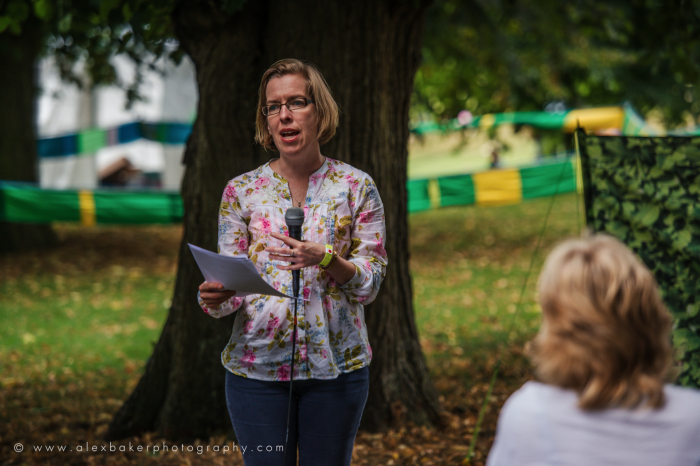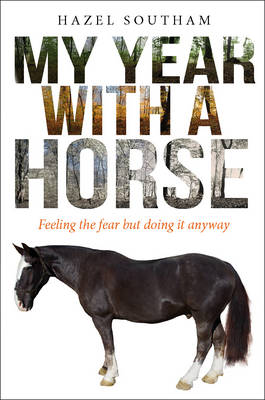'God is there whether you can feel his presence or not'
Former Baptist Times editor Hazel Southam had always been scared of horses – until one helped her through the hardest year of her life.
Her first book My Year with a Horse tells of her companionship with Duke as her father's dementia worsened: a year of illness, loss and grief, as well as solace and healing in the Hampshire countryside. Interview by Alex Baker

As a long-time journalist (and former editor of The Baptist Times) this is your first book - what compelled you to write now? Is the act of creation/writing cathartic? Did you always want to write a book or did you write a book because of what happened?
Neither. I never wanted to write a book because it is far too many words. If you’re a journalist you have about 1,000 words in you at any given moment, and no more. The notion of writing a book felt like lunacy - who wants to write 70,000 words? I’d always turned down offers to write a book but then the person who was my editor just kept nagging and nagging so I came up with this idea of a woman who’s essentially scared of horses gets through the hardest year of her life with the help of a horse. They really liked that so my bluff was called - I then had to write it.
Was it cathartic? No, not remotely. The book was written in months, it charts one particular year. And the really difficult month is March. So I wrote the introduction and then January and February but I just could not write March. For months and months and months I was getting nowhere. I just couldn’t face re-living it. Once I got over March it became easier to write but using the word ‘easier’ very broadly.
Would you say it was an easier book to write because it was so personal or much harder?
There’s really nothing easy about writing 70,000 words. It’s just hard graft. It’s an alarming amount. When you’re sitting there writing it, it’s just like any other piece of writing work. No faffing. And I couldn’t really picture it as a book. So when it turned up on my doorstep I was like, “Oh my word, an actual book”. So it’s been an unusual process. With news it’s normally “here today, gone tomorrow” but a book hangs around.
This is a personal story, dealing with grief, depression, hope even. What are your hopes for the book?
People do ask me, “have you been changed by this?” “Has God spoken to you?” I just want to shake them and say, “Life’s not like that”. There are three things:
-
God is there whether you can feel his presence or not – in all of the crap it was difficult to feel God was there, but the circumstances and spiritual reality can sit side by side
-
If you get out among nature it’s much easier to remember that there’s a loving God – you are in creation, you are obliged because you wonder if there’s a creator. Plus, if you are on a horse you stop thinking about all the stuff and there’s peace in your head.
-
Take one day at a time – I didn’t. I spent the whole time worrying about my dad. “Can we get him into a care home” “Which care home?” “What kind a care home?” “Would we be able to afford it?” Just endless “what-ifs?” which would start up again as soon as I went to bed. It was a perpetual cycle. I was looking into the future at the things I couldn’t control. Towards the end I got better when I just focused on one thing, one day at a time.

What impact has this experience (and the act of writing the book) had on your faith? Those three conclusions you mentioned, when did you arrive at them?
Probably in preparing this talk when you have to stand back from everything. Did writing it impact my faith? I’m not sure. I spend every day writing so it was just more words than usual.
Are you proud of the book?
Gosh. I’m never proud of anything. I’m British, I’m modest. I’d rather not talk to anybody about it really. My mum’s proud of it.
How do you feel about having such a personal part of your life out there?
It’s like running around naked. It’s odd. But I did do it for two reasons:
-
I wanted to thank Duke for being such a total mate. It’s traditional to take carrots but I am a writer so I wrote a book. I wanted there to be a legacy for him. He wasn’t just a horse who lived and died but was a creature which changed my life.
-
I hope by writing this that other people also realised they weren’t alone in this, and that they could draw strength from this. I was doing a book signing and people were saying, “it’s an inspiration”. It’s humbling which means it is resonating. You can’t go through life without experiencing hard times so other people’s stories can be encouraging.
Would you write again?
Initially I was like “Absolutely not, you must be joking!” but then last week I had an idea. So probably. There will be more late nights. You just keep plodding along. With writing features you have a new story each time whereas with a book it just keeps going.
How do you feel now about everything that happened with your family and your dad?
You wouldn’t wish dementia on someone you really disliked but to see it happen to one of the closest people in your life who you love and respect is a horrible thing. He was both highly intelligent and very practical. He lost both, two things which made him who he was. He lost everything which made him him. There was nothing I could do to stop it happening. I was used to be able to fix things or finding someone who could. It was a terrible thing.
Hazel Southam is an international journalist who has reported from 34 countries around the world. A former editor of The Baptist Times, she has written for a wide range of newspapers and magazines including The Times, Telegraph, Guardian and Observer. My Year With A Horse, published by Lion, is her first book.
The interview took place at Greenbelt 2016, where Hazel gave a book reading and answered questions.
Alex Baker is the former sub-editor and movie reviewer of The Baptist Times who now works as a photographer www.alexbakerphotography.com
Baptist Times, 21/03/2017